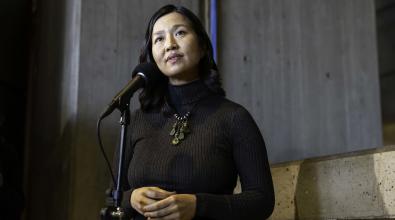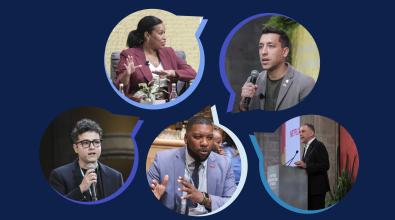How crowdsourcing drives citizen engagement

When the Syracuse, N.Y., innovation team set out to pick its area of focus for 2018, they didn’t just go with their gut feeling. They turned to residents, both to suggest lots of ideas and to help pick a winner.
In some ways, it was an obvious move. A new mayor, Ben Walsh, had just taken office after a campaign in which he’d stressed improving citizen engagement. It was only natural to ask residents what sorts of challenges the city’s in-house innovation experts should tackle.
On the other hand, crowdsourcing isn’t as simple as it sounds. While there are tons of digital tools that can help tease out ideas from residents, knowing how and when to use those tools can be tricky. That may be why crowdsourcing remains a relatively underutilized tool for citizen engagement. Only 26 percent of U.S. mayors say their cities use it, according to Bloomberg Philanthropies’ 2018 American Mayors Survey.
Syracuse provides a good example of how crowdsourcing can work. In January, the i-team solicited ideas from residents on social media and through a popular local listserv. They also went to public events and asked residents to write ideas on sticky notes and post them on a giant board labeled “To Do.” In all, more than 300 ideas were submitted.
Next, the i-team grouped those ideas into themes and sent the six most popular ones back to residents for a vote. People could cast a ballot via an online platform called D21 or vote with pen and paper at a library or community center. Almost 900 votes came in. After consulting with the i-team and the city council, Mayor Walsh picked “housing stability” as the winning issue. That issue actually had finished second to “sidewalks” in the voting, but the mayor reasoned that the city already had sidewalk-repair plans in place — and that preventing evictions and foreclosures would help more people in struggling neighborhoods.
“It was a big win,” said Adria Finch, the city’s Director of Innovation. “We’ve certainly solicited ideas from the public before, but we’d never seen participation like this.”
Identifying local business needs in Jerusalem
Crowdsourcing may not be easy, but it’s a tool a growing number of the Bloomberg Philanthropies-funded i-teams are turning to. Working out of city halls in 24 cities in the U.S., Canada, Israel, and France, these teams are tasked with finding creative solutions to the most pressing urban challenges. Robust citizen engagement — one of the core capacities for creating a culture of innovation in local government — is part of the i-teams’ DNA.
For example, when Jerusalem set out to support small-business development, the city’s i-team devised a creative way residents could help. They started with a simple question for which everyone has an opinion: What local businesses does your neighborhood need? Then they devised an online survey that not only solicited open-ended ideas — “A bakery!” “A pharmacy!” — but also presented users with choices of specific types of businesses they could click on to register support for. (You can try the survey here; it’s live but no longer collecting data.)
As Jerusalem is known for its cultural diversity, its i-team made a big push to ensure residents from every corner of the city participated. People could take the survey in Arabic, English, or Hebrew. The team used Facebook for outreach in Arab and secular Jewish neighborhoods. But in ultra-Orthodox communities, where the platform is used less often, the team used in-person canvassing.
The survey netted more than 100,000 responses from 15,000 people, yielding valuable market research at a granular neighborhood level. (Fun fact: The largely Arab quarters of East Jerusalem most want gyms and sports facilities, while the largely Jewish quarters of West Jerusalem most want cafes and pubs.) The i-team is sharing that research with hundreds of local entrepreneurs, as part of a broader initiative to help local startups succeed.
“It was a way to show business owners and entrepreneurs we want to help them open better and stronger businesses,” said i-team Director Sharone April, noting that eight other Israeli cities plan to borrow the survey for their own use. “It’s also very simple to explain. People like being asked what’s missing near their homes.”
Re-imagining community spaces in Boston
Boston also is asking residents what’s missing in their communities, but in a different way. The city’s i-team, part of the Mayor’s Office of New Urban Mechanics, is working on fostering so-called “third spaces” — places from parks to barbershops to coffee shops where people gather and connect. As part of the initiative, the city is now embarking on two crowdsourcing experiments.
One, called the Public Space Invitational, is a challenge program that seeks ideas for fostering play, performance, and social connections in three community gardens. Residents must submit ideas by May 11 that “make gardens more inviting, functional, user-friendly, and fun.” Winning proposals will receive up to $9,500 to implement.
The other experiment is broader in scope and mixes crowdsourcing with its cousin, crowdfunding. This initiative is a partnership between the city and the civic crowdfunding platform ioby. Any resident with an idea for creating a third-space project can submit it to ioby’s Boston page. Representatives from the site then follow up with one-on-one coaching on how to scope a project, write a budget, and use the platform to launch a fundraising campaign.
While other cities such as Memphis, Pittsburgh, and London have leveraged crowdfunding to support grassroots-driven projects, Boston’s Stephen Walter said this is his city’s first foray. “We’re really interested in finding how we, as the city of Boston, can help support the build-out of third-space projects from the ground-up,” he said. “We’re also interested in how a crowdfunding platform like ioby could potentially help that, and also what the pitfalls or limitations are.”
So far, four project proposals have come in, with more expected after the city held a community crowdfunding workshop in April. The most ambitious project so far is seeking to raise $10,000 to refurbish outdoor common areas at a local elementary school. (They have $4,000 more to raise in the next three weeks.)
“We hope the community sees the value and pitches some projects,” Walter said. “We’re really interested in what we can learn from this.”


